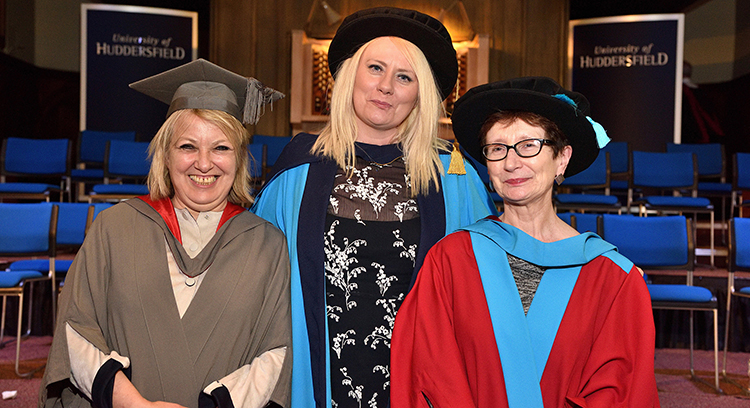“Injustice from being in care can be overcome by social workers”
 Honorary Doctor Jenny Molloy (centre) pictured with Ruth Neville (left) the course leader for the work-based route into social work and Professor of social work Brid Featherstone
Honorary Doctor Jenny Molloy (centre) pictured with Ruth Neville (left) the course leader for the work-based route into social work and Professor of social work Brid Featherstone
Tue, 15 Nov 2016 15:10:00 GMT
Jenny Molloy received an Honorary Doctorate of the University for services to social work and children in care
A WOMAN whose childhood experience of the care system turned her into an author, Government advisor and leading advocate for compassionate social work has been honoured by the University of Huddersfield.
Jenny Molloy is the author of a sequence of books beginning with Hackney Child that described the extreme neglect she suffered, followed by residential care. Although she initially wrote under a pseudonym, she eventually revealed her true identity, helping to reduce the stigma attached to an upbringing in care.
She is now called on by government bodies and ministers to give advice on the care and fostering of children, and she helped to establish the Care Leavers’ Charter in 2012.
Now, she has received an Honorary Doctorate of the University of Huddersfield, for her services to children in care, care leavers and social work. The honour was bestowed at a ceremony that conferred degrees on a large number of graduates in the field of social work.
Jenny Molloy had uplifting advice for them, saying that the injustice that people feel from being in care can be overcome by the “immensely, beautiful, courageous and professional” conduct of social workers.
“Each and every one of you could be one of those people,” said Jenny at the graduation ceremony.
She received an oration from Ruth Neville, the University of Huddersfield’s Course Leader for the work-based route into social work, who said that reading Hackney Child provided a reminder of why she had made her career as a social worker.
“In residential care, Jenny found food, warmth, comfort and solace, and for the first time she was able to develop relationships with adults whom she could trust – residential staff and social workers who worked tirelessly and compassionately to keep her safe, protected and feeling love.”
Jenny Molloy had also helped to revise attitudes – often negative – towards the social work profession.
“Her praise for social workers and for the positive impact the care system had for her often goes against the dominant narratives of social work and the care system,” said Ruth Neville.
“She works in a climate that is eager to blame social workers when things go wrong and where there are high profile inquiries and serious case reviews examining the historical and current failure of professionals, public bodies and other organisations to prevent the systematic abuse of children – often by the very people charged to protect them.
“However she does not embrace the system or the profession uncritically or unconditionally,” continued Ruth Neville.
“Through her writing, training, campaigning and advocacy she reminds us that the shocking statistics around care leavers and homelessness, drug addiction, offending, revolving door prison sentences and repeating, at times, the cycle of care for their children, should arouse anger that our most vulnerable children and young people continue to be let down – and that anger must be translated in to a determination to make changes happen.”







